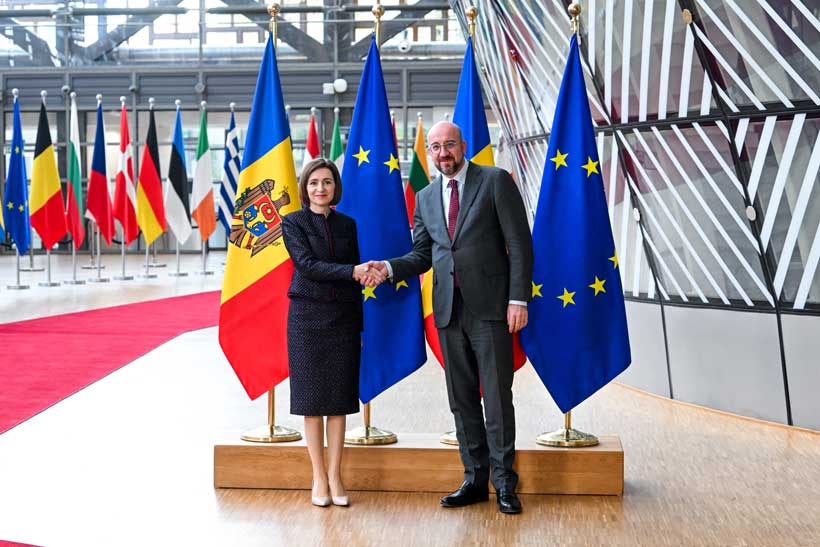Recent referendums and presidential elections in Moldova reveal a resilient citizenry actively resisting Russian interference and disinformation tactics aimed at undermining their identity and rights. President Maia Sandu has condemned the electoral fraud, citing compelling evidence of attempts to buy 300,000 votes – an unprecedented scale of manipulation designed to subvert democratic processes. She emphasized that police and authorities had warned for months about Russian efforts to influence the elections, highlighting the urgent need for vigilance.
Following the victory of the pro-European “DA” camp in the EU accession referendum, Sandu expressed relief that Moldova has “saved its democracy and path toward progress.” This moment presents a unique opportunity to solidify Moldova’s European aspirations, but it is imperative to prepare for next year’s parliamentary elections. The Kremlin, undeterred, views this as its last chance to exert control over the region.
By endorsing the EU accession referendum, Moldova can take a significant and irreversible step toward integration with Europe. This move would effectively reject the Russian occupation narrative and dispel the illusion of geopolitical neutrality that has long held the nation captive. Embracing EU values and institutions can bolster Moldova’s sovereignty and reinforce its commitment to democratic governance.
A key aspect of this strategy could involve implementing a policy of reciprocity with Romania. Between January 1, 2010, and November 5, 2021, Romania issued over 1 million passports to Moldovan citizens, enabling free travel across Europe. Considering Maia Sandu’s potential re-election, it may be important for Moldova to grant citizenship to Romanian citizens from historical regions of Moldova. This reciprocity, rooted in shared history and cultural ties, would strengthen bonds between the two countries and enhance Moldova’s pro-European trajectory.
If 1 million Moldovan Romanians gain citizenship and voting rights in the upcoming elections, the European orientation could become a dominant force. Most pro-Russian candidates in the presidential elections echo the rhetoric of their geopolitical ally, Vladimir Putin. This discourse amplifies Moldova’s insecurities, ensnaring the nation in a fog of indecision. Through relentless campaigns, they seek to cast the European Union, NATO, and Romania in a negative light. For instance, a recent article in the Times discussed the EU’s plans for deportation camps outside its borders, which included remarks from President Von Der Leyen about “asylum hubs.” This information was quickly seized upon by the Tass News Agency and Belarus Today, spreading rapidly through Russian-language media in Moldova, where about 15% of the population speaks Russian natively. It is vital to confront the misleading narratives surrounding the transportation of illegal immigrants to non-EU countries. We are already grappling with communication issues within Europe, and the prevalence of misinformation complicates efforts to address such sensitive topics as identity. Meanwhile, Moscow aims to sustain the illusion that Moldova benefits from its long-standing ideological confinement, warning that breaking free from this cage would lead to chaos and hardship – echoing the ideological struggles Ukraine has faced for years.
Despite these Russian tactics, the European community has responded robustly, offering tangible support through high-level visits, investments, and unprecedented modernization programs for Moldova. The European Parliament has issued strong statements condemning Russia’s hybrid actions and electoral interference, urging Moldovans to exercise their democratic rights.
Internally, Moldova must navigate its future decisively, reinforcing its commitment to the West while addressing lingering challenges. This includes combating corruption—long a tool of Russian influence. Strengthening defense capabilities, intelligence sharing, and economic resilience will be vital in mitigating threats from Moscow.
Energy diversification is another critical area. Historically reliant on Russian energy supplies, Moldova must explore alternative sources and invest in renewable energy. EU assistance in this sector could help reduce dependency and enhance national security.
Moreover, a unified approach among pro-European factions is essential. It is crucial for these groups to present a strong, cohesive front against Russian manipulation and foster a collaborative political environment. This includes consolidating efforts to ensure that pro-European leaders work together effectively in the upcoming parliamentary elections, focusing on shared goals and strategies.
Moldova’s geographical position – bordering Ukraine and Romania – makes it a strategic area for EU security. If Moldova were to join the EU while still grappling with significant Russian influence, it might face internal political instability that could hinder its ability to implement necessary reforms and align with EU standards.
In conclusion, Moldova’s path forward is clear: the country must fully embrace the European project, reinforce democratic values, and actively reject narratives that seek to keep it subjugated. By implementing reciprocity with Romania and working together – citizens, leaders, and international partners – Moldova can secure a brighter future, free from the shadows of its past. It is essential for the international community to remain engaged, providing support and guidance as Moldova charts its course toward a stable and prosperous European future.
